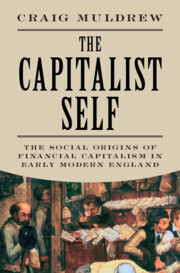Refine search
Actions for selected content:
4 results
3 - The Financial Revolution in English Localities
-
- Book:
- The Capitalist Self
- Published online:
- 12 October 2025
- Print publication:
- 30 October 2025, pp 101-164
-
- Chapter
- Export citation

The Capitalist Self
- The Social Origins of Financial Capitalism in Early Modern England
-
- Published online:
- 12 October 2025
- Print publication:
- 30 October 2025
5 - From Paper to Gold
- from Part II - The Art of Survival
-
- Book:
- Sovereignty without Power
- Published online:
- 27 October 2022
- Print publication:
- 03 November 2022, pp 116-138
-
- Chapter
- Export citation
Immanuel Kant, Preliminary Notes and Reflections to the Introduction to the Metaphysics of Morals, Before 1797
- from V - Freedom and Choice
-
- Book:
- Kant's Early Critics on Freedom of the Will
- Published online:
- 24 March 2022
- Print publication:
- 31 March 2022, pp 229-231
-
- Chapter
- Export citation
